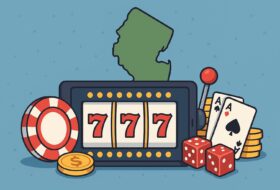
Joseph Shiaref is suing Ameristar Casino for $3 million, saying it detained him illegally due to suspicions that he was counting cards at blackjack. The lawsuit also names the Colorado casino’s owners, the city of Black Hawk, a Colorado Division of Gaming (CDG) agent, and a police officer as defendants. Black Hawk is one of Colorado’s three gambling towns, about an hour outside Denver.
According to the suit, Joseph Shiraef had a long layover in Denver while traveling on Oct. 19, 2021. He decided to make a side trip to Black Hawk to play blackjack. There, he claims he was physically prevented from leaving the casino after being told he had committed a “criminal violation of the Colorado fraud statute by counting cards.”
Shiraef claims he was detained without probable cause, that his Fourth Amendment rights were violated, and that the defendants falsely imprisoned him. The Fourth Amendment protects people from unreasonable searches. The complaint also faults the city of Black Hawk for not properly training its police officers.
Shiraef initially filed the lawsuit on Oct. 7, 2022, and amended it on Dec. 5, 2022. He seeks $1.5 million in monetary damages and a further $1.5 million in punitive damages, plus attorney’s fees.
The city and Patrol Sgt. Stephanie Whitman filed a motion to dismiss on Dec. 19, 2022. They argue that the plaintiff’s claim fails to establish grounds on which the city would be liable. The defense team added that the officer is entitled to qualified immunity as a government official.
Details on the Incident
According to the suit, Shiraef was playing blackjack for a few hours and down about $4,000 when a casino manager asked him for identification. The plaintiff claims he refused because he had already provided such identification several times. That’s when the situation allegedly escalated.
The manager told Shiraef he couldn’t cash out his remaining chips —worth about $1,800— unless he showed his ID. After continuing to argue for some time, Shiraef told the manager that he had to catch his flight and would file a complaint with the CDG later. He says he was stopped on his way out of the parking lot by CDG agent Joseph Nguyen.
Shiraef says he showed his identification to Nguyen but refused to relinquish possession. He proceeded to call 911 because he felt he was wrongfully detained. Witman was the police officer who arrived on the scene. She allegedly took Shiraef’s identification from him and gave it to Nguyen. Shiraef says Witman told him that Nguyen held “more authority” than she did and to follow his instructions.
Nguyen allegedly left with Shiraef’s identification and, upon returning, told the plaintiff that he was suspected of “the possibility of fraud acts.” According to the complaint, he said these included counting cards and that it could lead to an arrest warrant for Shiraef.
The lawsuit argues that counting cards is legal and that Shiraef had done nothing that would justify his detainment, refusal to cash out his chips, or threats of criminal charges.
What is Card Counting?
Card counting is an advanced blackjack strategy where the player attempts to keep track of the relative number of high and low cards left in the deck. The game’s probabilities shift slightly with each hand until the dealer hits the cut card, prompting a reshuffle.
Advantage players use card counting to determine when the odds have skewed in their favor, at which point they can increase their bet size. A deck containing a higher-than-normal proportion of face cards and Aces favors the player. Conversely, a deck with many low cards is unfavorable.
Card counting involves keeping a mental note of these ratios. When enough of the low cards are gone, the deck turns “positive,” meaning it becomes possible for the player to turn a statistical profit.
Note that card counting works only at retail casinos. The strategy won’t work when playing blackjack online. Online versions of the game use random number generator software and shuffle the cards for every hand.
The Legality of Card Counting
It’s up to the court to decide the merits of Shiraef’s complaint. However, on the legality of card counting, he is correct. Counting cards is legal in Colorado and throughout the US, provided the player is not using any equipment to help them.
Daniel Carr, spokesperson for the Colorado Department of Revenue, which oversees gambling told the Denver Post that in the state, “it is not illegal to count cards using your brain.”
However, Carr also pointed out that casinos can ask anyone suspected of card counting to leave and ban them from future access to the property. If one casino bans a player, other local casinos will often follow suit.





